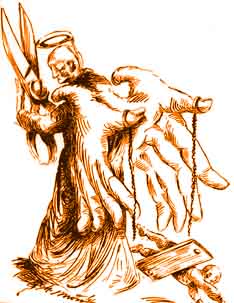|
|
Roger Simon
I'LL TELL YOU a story about South Africa 20 years ago, when I first went there, and how I
found things when I went back last week.
First, 20 years ago:
I had gone to South Africa to do a series of articles on apartheid. I spent a month
traveling all over and talking to people of different races.
I heard many horror stories. Many blacks showed me their scars from shootings
and beatings. They told me tales of prison and torture. I saw the appalling conditions
that they were forced to live under.
But then, it was suggested to me that I interview some blacks who were doing well.
The South African government loved to brag about such people and had spent millions
So, I arranged to meet a successful black man. He was not an apologist for the
apartheid system. He was a black man who, from a material standpoint, had "made it."
We arranged to meet in the city of Durban, where I was staying and where he was
visiting on business.
I asked him to lunch at my hotel, one of the few hotels in the entire country that allowed
black and whites to eat together in a restaurant.
The restaurant, like Durban itself, was stately and elegant, reflecting the old days of
British rule. Indian laborers had been brought to Durban by the British, and the city is
still the center of South Africa's Indian population.
Indians, officially classified by the government as Asians, had more rights than blacks
back then but nowhere near the rights of whites.
If this all sounds confusing, that is because the South African racial classification
system was kind of a refined madness.
When I was there 20 years ago, Indians were classified as Asians, Chinese were
classified as a subgroup of Coloreds (i.e. mixed race), and the Japanese were
classified as honorary whites. Each had different rights under the law.
The restaurant of the hotel was decorated in a grand style with Indian waiters dressed
in gleaming white jackets and red turbans.
I got to the table first, and as my guest entered the room and I rose to greet him, I
could see the faces of the waiters harden.
That is because in South Africa, Indians were not used to waiting upon blacks.
But at this restaurant, they could hardly refuse. They could hardly refuse because this
black man was the guest of a white man.
Ridiculous? Not in South Africa. In South Africa, this was a way of life.
My guest sat down at the table, and we began to talk about his life. How he had risen
by dint of hard work from the lowest of the low to his current level of success. He could
now dress well and live well and provide for his children.
And, really, what more was there to life?
We ordered lunch, and after a few moments, the soup arrived. The restaurant was so
fancy that the salt on the table was not in shakers but heaped on tiny crystal trays.
My guest took a pinch of salt for his soup and then handed the tray to me.
But before I could take it, a waiter rushed up, took the tray from his hand and
disdainfully dumped the contents on the floor.
Then, the waiter handed me a tray from another table.
My guest froze. For a second, I did not realize what had happened.
After a long moment, my guest spoke quietly without lifting his eyes from the table.
"Now, you see," he said. "Now you see what it means to be a 'successful' black man in
South Africa."
And I always remembered that little, seemingly insignificant incident. I always
remembered how easily the image of success can be shattered, how quickly the
comfortable veneer stripped away.
I always remembered that no matter how far a black man could rise in that South
Africa, he was still considered unfit to touch the same salt as a white man.
Last week, I went back to South Africa with Bill Clinton, as part of his 13-day,
six-country tour.
In many significant ways, a revolution had occurred. The president of South Africa is
Nelson Mandela, a black man. The parliament is multiracial, and everybody can vote.
Discrimination, once the law, has now been outlawed.
So did I find paradise?
No, of course not.
I went into restaurants where blacks can now freely eat and found none because they
cannot afford a restaurant meal.
I went into neighborhoods where blacks can now freely live and found none because
they cannot afford such houses.
I went back to Soweto, where 20 years ago I found shacks without electricity and
running water, and found many fewer such places but still many too many.
Crime is rampant in many South African cities -- everyone traveling with the White
House was warned to stay away from Johannesburg's central business district, where
20 years ago I could walk freely -- affecting people of all races.
But still, things are better.
There is a prevailing feeling today that was in very short supply 20 years ago: hope.
The old South Africa tried to crush hope and failed.
The new South Africa provides hope and struggles mightily to
 South African memories --- and a paradise not yet found
South African memories --- and a paradise not yet found
 putting slick ads in American publications bragging about how good things were.
putting slick ads in American publications bragging about how good things were.
3/24/98: Bill's 12-day safari
3/20/98: Peace for Ireland?
3/18/98: Flat tire? Spare me
3/13/98: Latrell Sprewell's genius
3/10/98: On truth and reality
3/5/98: No, I'm not harrassing Hillary
3/3/98: The Unforgettable Henny Youngman
2/26/98: Grow up, boys!
2/24/98: Go get 'em, Bill!
2/19/98: My 15 minutes
2/17/98: The manic-depressive presidency
2/12/98: Drip, Drip, Drip
2/10/98: Clinton tunes out the networks
2/5/98: The flight of the Beast: America's love-hate relationship with scandal
2/3/98: Speaking Clintonese
1/29/98: What the president has going for him
1/27/98: Judgment call: how Americans view President Clinton
1/22/98: Bimbo eruptions past and present
1/20/98: Feeding the beast: Paula Jones gets the full O.J.
1/15/98: Let's get it over with: it's time to deal with Saddam, already
1/13/98: Sonny Bono is dead, let the good times roll
1/8/98: Carribbean Cheesecake: First couple has cake, eats cake
1/6/98: PO'ed: a suspected druggie jumps through the employment hoops
1/1/98: Cures for that holiday hangover
12/30/97: Buy stuff now
12/25/97: Peace to all squirrelkind
12/23/97: Home for the Holidays: Where John Hinckley, never convicted, will not be
12/18/97: Bill's B-list Bacchanalia: Press and politicos get cozy, to a point
12/16/97: All dressed up... (White House flack Mike McCurry speculates on his next career)